- Home
- Jim Eldridge
Murder at the Ritz Page 8
Murder at the Ritz Read online
Page 8
As they left Waterloo police station and made for their car, Coburg commented: ‘It looks like we’re getting a bit of a picture.’
‘Big Mel?’ asked Lampson.
‘Yes. If Williams and Thackeray are part of Big Mel’s crew, that could explain why Williams might be involved in something as big as two million in money and gold.’
‘I don’t know, guv,’ said Lampson doubtfully. ‘He’s got fingers in lots of pies, but most of his business is around smaller operators, and people he knows.’
‘At which he makes a lot of money,’ said Coburg.
‘Yes, he does,’ agreed Lampson. ‘But this business of all that wealth still seems a bit much for him.’
‘Maybe he’s getting ambitious,’ said Coburg.
‘So, what’s our next move? McGuinness?’
‘No, we’ll let him stew for the moment. It’s my guess that as soon as we left El Torero, our friend Stavros Higgins let Big Mel know we were asking questions about Williams, so he’ll know we’ll be calling on him. First, we’ll take a look at Joe Williams’s address, and at the same time have a word with this Billy Thackeray if he’s there.’
Big Mel McGuinness was sitting at his regular table in the saloon bar of the Iron Horse reading a newspaper, a cup of tea in front of him. McGuinness liked to keep a clear head when conducting business, and – for him – most of what went on in the pub was business. He was called Big Mel because big was what he certainly was: six feet six inches tall, broad-shouldered with a muscular build. In his early days McGuinness had been an amateur boxer, and a successful one. There had been talk of his turning professional, but the shrewd McGuinness had realised there was more money to be made from managing other boxers, especially if he also ran bets on the outcomes of the fights. Knowing in advance who was going to win was key to that.
The door of the bar opened, and the thin, wiry figure of Charley Barnes entered. Charley was in his forties and his skin had never quite shaken off the impoverished pallor from his early years. That, coupled with his thinning hair and his habit of wearing clothes that had seen better days, gave the impression that he was a vulnerable person, a victim ready to be mugged. Only people who didn’t know Barnes ever made that error, and they usually carried the marks of their mistake ever afterwards.
Barnes sat down at the table. ‘I got your message, Mel,’ he said. ‘Something’s come up?’
McGuinness put down his newspaper and nodded. There were very few people in his business that McGuinness trusted, when you were dealing on a daily basis with people who were basically crooked the only thing you could be sure of was that they were highly likely to let you down in some way: skimming off the top, either money or goods, or selling information to a rival. McGuinness had a strict policy that anyone caught doing anything like that was severely punished before being cast out, though some still tried it on. But not Charley Barnes. McGuinness trusted Barnes with his life, and his money, both of which were of equal importance to him.
Barnes and McGuinness went right back to the time they were in prison in their early twenties. Separate offences, McGuinness for robbery and Barnes for car theft, but they’d hit it off, with both looking after each other’s backs. Prison was a tough place and defending each other for the year they spent inside had forged a bond between them. McGuinness may have been the brighter of the two, but Barnes was the muscle. And when they came out, that was the way it had continued: McGuinness using his brains – and Barnes’s fists and boots, along with the occasional gun or blade – to build up an organisation.
‘Joe Williams is dead,’ said McGuinness. ‘Someone cut his throat in one of the suites of the King of Albania at the Ritz.’
Barnes frowned. ‘What was Joe doing there?’
‘I don’t know,’ said McGuinness. ‘One thing’s for sure, he wasn’t there doing anything for me.’
‘The King of Albania,’ mused Barnes thoughtfully. ‘The word on the street is he arrived with a stash of cash.’
McGuinness nodded. ‘Two million, I hear. Most of it in gold bullion, plus foreign currency.’
‘I can’t see Joe going after that on his own,’ said Barnes.
‘Nor can I,’ agreed McGuinness. ‘But can you think of any other reason he’d be in this king’s suite?’
‘No,’ admitted Barnes. ‘But who killed him? The King’s bodyguards?’
‘If so, why didn’t they get rid of the body?’ asked McGuinness. ‘The thing is: if Joe was working for someone else, who?’
‘Maybe we should have a word with Billy Thackeray,’ suggested Barnes. ‘Him and Joe were very tight.’
‘Yeh, good idea,’ said McGuinness. ‘You do that, Charley. Meantime I’m going to get someone to have a word with a little bird.’
The address for Joe Williams and Billy Thackeray was a tall, thin lodging house sub-divided into bedsits backing on to Waterloo Station. Joe’s room was number 3, on the ground floor, and Thackeray’s was room 7 on the second floor, the top floor of the house. As Coburg and Lampson mounted the staircase to the top landing they could feel the house vibrating from the heavy engines moving out of the train station, and even though the windows were closed the smell of coal from the trains’ smoke permeated into the house. The building was shabby, no carpet on the stairs, just bare wooden boards, and the paint on the interior walls was flaking and looked as if it had been that way for some years.
There were three bedsits on the top landing, number 7 being nearest to the stairs. Coburg knocked at the door, at first lightly, but when there was no answer he banged harder, his rapping bringing the irate occupant of the next door bedsit to his door, clad in a vest and trousers, his feet bare.
‘What you up to?’ he demanded angrily. ‘I’m on night shift and I’m having enough trouble getting to sleep as it is.’
Coburg and Lampson both produced their warrant cards and held them out to the man.
‘Police,’ said Coburg. ‘We’re looking for Billy Thackeray.’
‘Huh, you and half the world!’ said the man sourly. ‘Well, I’ll tell you the same as I told them, I ain’t seen nor heard him for a few days. And usually, when he’s in, he gets drunk and starts singing, and there ain’t been nothing like that from him.’
‘When did you last see him?’ asked Coburg.
The man frowned, thinking about it. ‘Three days ago,’ he announced finally. ‘Monday morning. I was trying to get some sleep after coming in from night shift, when he started his singing and shouting. So, I had words with him. That was the last time I saw him or heard him.’
‘You say other people have been looking for him,’ said Coburg. ‘Who?’
‘No idea,’ said the man. ‘Blokes, that’s all I know. They came knocking on the door, just like you, loud enough to wake me up, and shouting his name, going “Open up, Billy!”’ He reached inside his room and produced a stout length of wood with a ball of lead at the top. ‘I showed ’em this, and they scarpered.’
‘Yes, I’m sure they did,’ said Coburg. ‘You never asked who they were?’
‘I’m not interested in who they were,’ snapped the man. ‘I’m only interested in getting some sleep.’
‘Were any of them foreign?’ asked Coburg.
‘Foreign?’ asked the man. ‘How would I know?’
‘From the way they spoke. The way they looked.’
‘No. They sounded local to me. Now, can I get back to sleep?’
‘Certainly,’ said Coburg. ‘We’re sorry to have disturbed you. And thank you for your assistance.’
The man frowned suspiciously. ‘You sure you’re coppers?’ he asked. ‘You sound a bit posh. I ain’t never had one talk to me like that before.’
‘Scotland Yard,’ said Coburg. ‘They give us elocution lessons.’
‘Elocution?’ frowned the man again. ‘Huh?’
‘Learning ’ow to talk proper,’ put in Lampson, deliberately emphasising his working-class London accent.
The man laughed. ‘I guess you wa
s out when they did them lessons.’
With that, he shut his door.
‘Right, so it’s a no show for Billy Thackeray.’
‘Reckon he’s done a runner, guv?’
‘Possibly. Or, in view of what happened to Joe Williams, something more sinister might have happened to him if he was part of what led to Williams getting killed.’ He looked at the lock, then looked towards the bedsit of the irate neighbour. ‘It’s a pity about our sleepy friend next door, otherwise this would be the right occasion to kick the door in. The lock doesn’t look much, but I don’t fancy upsetting him further.’
‘No need to, guv,’ said Lampson. He reached into his pocket and pulled out a key ring with some twisted bits of thin metal dangling from them, then knelt beside the lock, inserted two of the metal strips and manipulated them until they heard a slight click, at which Lampson stood up and pushed the door open.
‘That’s a useful skill to have,’ whispered Coburg as they entered the room.
‘Something I picked up when I was young,’ replied Lampson, also in a whisper, putting the lockpicks back in his pocket.
‘In Somers Town?’
Lampson nodded. ‘An uncle.’
‘You must have been a great disappointment to your family, Ted, joining the police.’
‘No, they understood. And they were never criminals.’
‘They just used some of the local techniques?’
‘Exactly.’
‘And they didn’t cut you off when you joined and put on the uniform?’
‘On the contrary, they were proud. Especially Mum. Someone respectable in the family.’
‘Lucky you didn’t have to arrest any of them.’
The pair set to work searching the property, primarily looking for letters or notes that might give a clue as to why Thackeray had vanished. All the time Coburg was expecting their search to be interrupted by the neighbour with his leaded stick, upset by the sounds of drawers and cupboards being opened, despite them working carefully. Coburg was well aware of how thin the dividing walls were in this type of property, and this was proved when he and Lampson heard the deep sound of snoring coming from next door. Lampson grinned, gave his boss the thumbs up and mouthed ‘Lucky us!’
There was very little that seemed relevant or useful in Thackeray’s room, but what there was Coburg and Lampson stuffed into evidence bags to be examined in detail later. Their search finished, they retreated to the landing, where Lampson relocked the door before they headed downstairs to the ground floor, and Joe Williams’s room.
Once again, Lampson did his wizardry with the lockpicks, and they began a search. It was Lampson who made the first discovery, a stash of lockpicks and skeleton keys in a drawer in the bedside cabinet.
‘Well, this is interesting,’ said Lampson, holding them up for Coburg to see them. ‘So, Joe was a peterman. Locks and safes. Which brings us back to the two million locked up somewhere in King Zog’s rooms.’
‘What’s more interesting is the fact they’re here in his room, rather than being in his pocket when we found him. If he was in the suite to open a safe or something, he’d have had them with him.’
‘Yes,’ agreed Lampson thoughtfully. ‘Maybe he was just casing the joint?’
‘He would’ve still had to have his tools of the trade with him,’ said Coburg.
Charley Barnes stood in the shadows of the wall around Waterloo Station and watched as Coburg and Lampson came out of the house. So, the coppers were doing their digging already. He waited until he was sure they were clear and in no danger of returning, then walked across the road and into the house. There was no use knocking on Williams’s door, so he went straight up to the top floor and room 7, where he banged on the door. When there was no answer, he banged again and followed it up with a boot hard against the lock, the door springing inwards.
He stood surveying the room. With Williams dead, he wondered if anything had happened to Thackeray. Maybe he’d done a runner. If so, Barnes needed to start looking for clues as to where he might have gone.
There was the sound of a door being thrown open and then a man in a stained vest entered the room swinging a leaded stick.
‘Right, you bastard—’ he began.
Then he stopped when he saw who it was and hastily put the stick down.
‘Mr Barnes,’ he said apologetically. ‘I’m sorry, I didn’t realise it was you. I’ve just had all manner of people banging on this door while I’m trying to get some kip.’
‘Were two of ’em coppers?’ demanded Barnes.
‘Yes, sir. They were just here.’
‘What did you tell them?’ asked Barnes, and even though he spoke quietly there was no mistaking the menace in his voice.
‘Nothing, I swear!’ burst out the man fearfully. ‘I never talk to coppers!’
Barnes studied the man, then asked: ‘When did you last see Billy?’
‘Monday morning. Here.’
‘And you ain’t seen him since?’
‘No. Honest. And I ain’t heard him, either.’
Barnes nodded. ‘Who else has been round asking for him lately?’
‘Joe Williams come round looking for him on Monday.’
‘Did he say why?’
The man shook his head.
‘What time of day was it when Joe came round?’
‘Afternoon. I’d just got me head down.’
‘Anyone else?’
‘Some bloke came on Tuesday afternoon.’
‘Who was he?’
‘I don’t know. I’d never seen him before.’
‘What did he look like?’
The man frowned, trying to remember. ‘He looked foreign.’
‘Foreign?’
‘Yeh. He had an accent. Maybe Greek. Something like that.’
‘What did you tell him?’
‘That I hadn’t seen Billy since Monday morning.’
‘What did he say?’
‘He started to get a bit stroppy, so I had to show him Len.’ He picked up his leaded stick. ‘When I did that, he left.’
Barnes nodded. ‘Anyone else?’
The man shook his head.
‘Right,’ said Barnes. ‘If you hear anything from or about Billy, you pop along to the Iron Horse and leave word for me.’
‘Yes, Mr Barnes,’ said the man.
‘And the same goes if you hear anyone asking after him. You come and let me know.’ He made for the door, the man moving aside to let him pass. Barnes pointed at the broken lock on the door. ‘Shoddy workmanship,’ he grunted. ‘They don’t make ’em like they used to.’
CHAPTER TWELVE
Julie sat in her room, smoking and thinking. Rosa was out but Donna had come home early because she only worked mornings on Thursdays. Glad of the company, Julie had once more started to express her bewilderment and her feelings about Joe, but Donna had begun to talk about her dead brother again.
I don’t want to talk about your brother, I want to talk about Joe, thought Julie in angry frustration.
‘I’ve got to go and get something sorted out upstairs,’ she said, and she left Donna in the kitchen.
In her room she lay on the bed and stared at the ceiling, her mind full of thoughts about Joe. She didn’t understand why she felt like this, so lost. It wasn’t as if she’d been in love with him. And it was true what Donna said, people were dying all the time. It was just where he’d died, and how, that baffled her. What had he been doing at the Ritz?
She heard the rat-a-tat of the door knocker, then the front door opening and Donna’s voice. Almost immediately there was a knock at her room, then Donna put her head round the door.
‘Hey, Julie. There’s two blokes at the door asking for you.’
‘Who are they?’
‘They didn’t say.’
‘What sort of blokes?’
‘They look official. You know, like plain-clothes coppers. What you been up to?’
‘Nothing.’
Curious, Ju
lie headed downstairs. What would anyone official be wanting with her?
The two men, both wearing hats and overcoats, stood waiting for her. The shorter of the two had a moustache, the other was thin and miserable-looking.
‘Miss Julie Stafford?’ the shorter of the two asked.
‘Yes.’
He produced a warrant card which he showed to her.
‘We’re from Special Branch. We’d like you to come with us to answer a few questions.’
‘What about?’
‘All we can say right now is that it concerns a matter of national importance. Would you come with us, please?’
‘No,’ said Julie. ‘I don’t know who you are, and I’ve done nothing wrong. If you want to talk to me you can do it here.’
The two men exchanged looks, then the shorter one said: ‘I’m afraid we must insist, miss. I can assure you this is just a routine enquiry, but if you refuse to accompany us we may be forced to take you in handcuffs, and I’m sure you won’t like that.’
Donna appeared, summoned by the angry tone in Julia’s voice.
‘What’s up, Julie?’ she asked.
‘This is nothing to do with you, miss,’ the shorter one said politely to Donna. ‘If you would please leave us to our business.’
‘These men claim they’re from Special Branch,’ said Julie, ‘and they want to take me away, but they won’t say why.’
‘As I said, miss, it’s on a matter of national security, so I’m not allowed to say more at this stage.’
Julie hesitated, then said: ‘I’ll go and get my coat and bag.’
‘Certainly, miss,’ said the short one. ‘My colleague will accompany you.’
Julie’s mind was in a whirl as she mounted the stairs to her room, the tall, thin, silent man close behind her. What was all this about? It could only be about Joe, the fact she’d recognised him from that photo that Rosa’s policeman friend had showed her. Was this down to him? He was a copper. Had he reported her or something? Was that what this was about? If so, she needed to get a message to him to get her out of it.
The tall man waited outside her room while she gathered her coat and her handbag, but Julie noticed that although he stayed on the landing, he kept his foot against the door so that she couldn’t close it. The man stood to one side as she came out of her room, then followed her back downstairs to the front door, where Donna was still standing, watching the short man suspiciously.

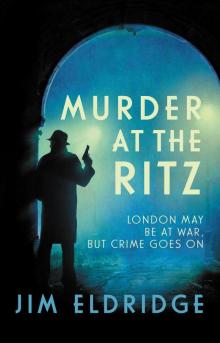 Murder at the Ritz
Murder at the Ritz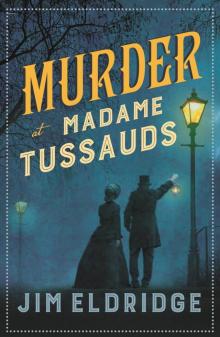 Murder at Madame Tussauds
Murder at Madame Tussauds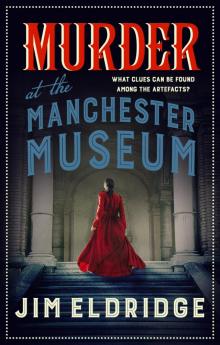 Murder at the Manchester Museum
Murder at the Manchester Museum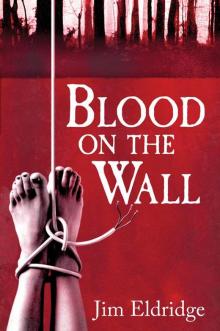 Blood On the Wall
Blood On the Wall 4.3.2.1
4.3.2.1 Jungle Kill (Black Ops)
Jungle Kill (Black Ops)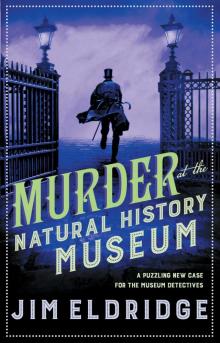 Murder at the Natural History Museum
Murder at the Natural History Museum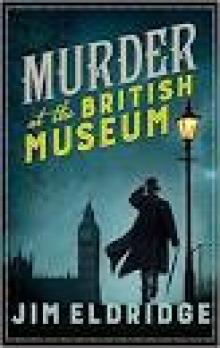 Murder at the British Museum
Murder at the British Museum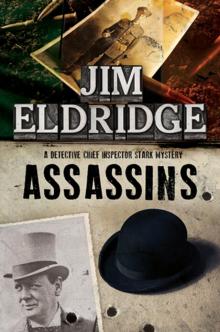 Assassins
Assassins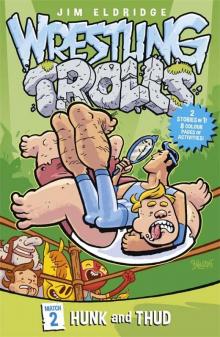 Hunk and Thud
Hunk and Thud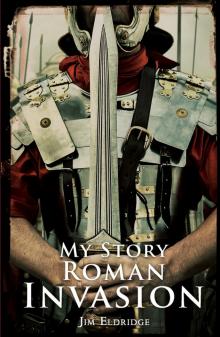 Roman Invasion
Roman Invasion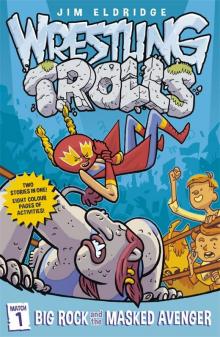 Big Rock and the Masked Avenger
Big Rock and the Masked Avenger The Last Enemy
The Last Enemy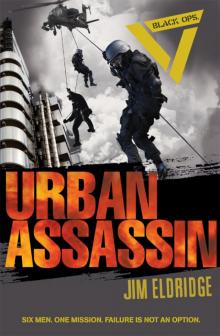 Urban Assassin
Urban Assassin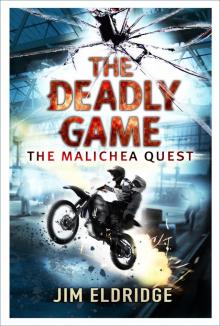 The Deadly Game
The Deadly Game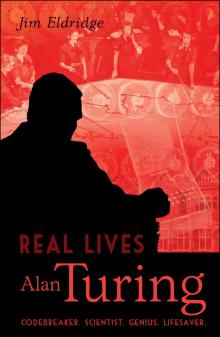 Alan Turing
Alan Turing The Lethal Target
The Lethal Target The Giant Rumble
The Giant Rumble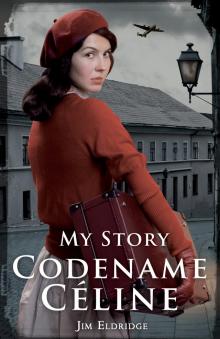 Codename Céline
Codename Céline Death in the Desert
Death in the Desert Escape from Pompeii
Escape from Pompeii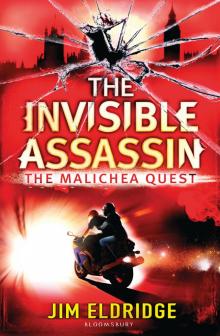 The Invisible Assassin
The Invisible Assassin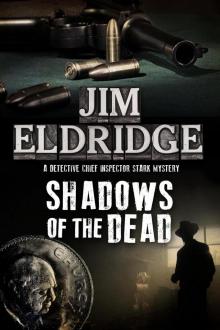 Shadows of the Dead
Shadows of the Dead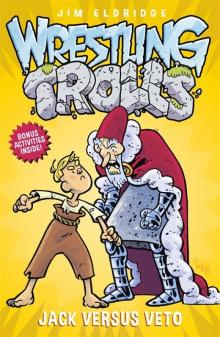 Jack Versus Veto
Jack Versus Veto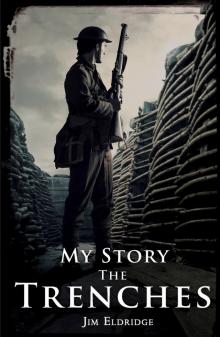 The Trenches
The Trenches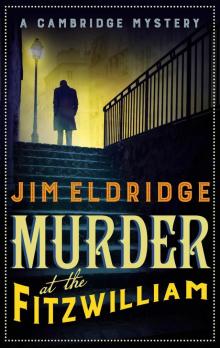 Murder at the Fitzwilliam
Murder at the Fitzwilliam Coming Home
Coming Home